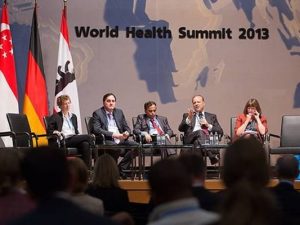
Leaders from the public and private sectors gathered at the World Health Summit in Berlin, Germany, on 20 October, to discuss the global introduction of the inactivated polio vaccine (IPV).
At a session entitled “Polio Eradication: Introducing IPV and Strengthening Routine Immunization,” panelists engaged in a dynamic discussion on the central challenges to introducing IPV in 124 countries over the next two years – the most ambitious vaccine introduction in history – and the incredible collaboration required across sectors.
To accelerate the elimination of wild- and vaccine-derived polio, the Polio Eradication and Endgame Strategic Plan 2013-2018 calls for countries using only the oral polio vaccine (OPV) to introduce at least one dose of IPV into their immunization schedules by the end of 2015.
The introduction of IPV will depend on rapid strengthening of immunization systems – another key component of the Strategic Plan. Nina Schwalbe, the GAVI Alliance’s Managing Director of Policy and Performance, discussed linkages between polio eradication and routine immunization, and highlighted how GAVI’s unique strengths make it a vital partner in the IPV introduction.
The panel included representatives from Brazil and India. Dr. Jarbas Barbosa, Brazil’s Secretary of Health Surveillance, described lessons learned from Brazil’s successful introduction of IPV into its immunization program in 2012, emphasizing the importance of community education. Dr. Vijay Yewale, President-Elect of the Indian Academy of Pediatrics, discussed India’s historic elimination of wild poliovirus and the importance of IPV introduction for protecting these gains. He stressed that the scale-up of immunization systems also enables other much-needed vaccines and health services to reach India’s most vulnerable children.
“Now is the time. We are mentally prepared, and we have the input we need, including political commitment and strong social mobilization,” said Dr. Yewale.
Finally, Sanofi CEO Chris Viehbacher addressed the industry’s commitment to supporting the vaccine needs of all populations, emphasizing the importance of private-public collaboration.
While the discussion highlighted the tremendous challenges ahead, what is clear is that partners have prioritized IPV introduction and are working closely together toward this important step in ending polio.
“This is not a trivial task. It requires the buy-in from manufacturers, WHO, GAVI, and the global community. But with everyone working together, we’re all on the same trajectory to achieve eradication,” said Prof. Elizabeth Miller, chair of the WHO Strategic Advisory Group of Experts (SAGE) Polio Working Group, who chaired and moderated the panel.
Ridding the world of polio won’t only ensure no child ever again suffers from this crippling disease. The infrastructure, assets and lessons learned from the polio program will improve our ability to deliver essential health services for years to come, and will show just what is possible when the world comes together to improve child health.
To watch the full panel discussion, visit the World Health Summit website.
To find out more about the introduction of IPV, visit the WHO’s webpage.



